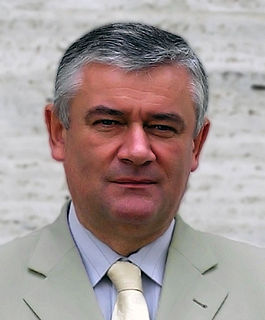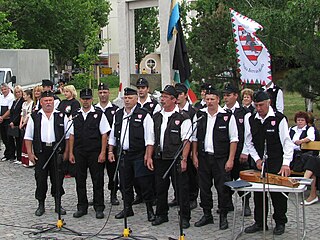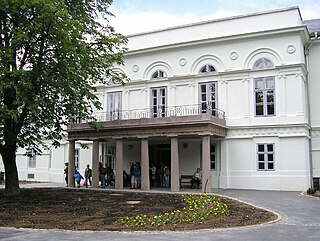IDE,iDE, or Ide may refer to:

Hu Yaobang was a high-ranking official of the People's Republic of China. He held the top office of the Communist Party of China from 1981 to 1987, first as Chairman from 1981 to 1982, then as General Secretary from 1982 to 1987. Hu joined the Chinese Communist Party in the 1930s, and rose to prominence as a comrade of Deng Xiaoping in the 1970s. During the Cultural Revolution (1966–1976), Hu was purged, recalled, and purged again by Mao Zedong.

Fidesz – Hungarian Civic Alliance is a national-conservative, right-wing populist political party in Hungary.

Viktor Mihály Orbán is a Hungarian politician serving as Prime Minister of Hungary since 2010. He also served as Prime Minister from 1998 to 2002. He is the present leader of the national conservative Fidesz party, a post he has held since 2003 and, previously, from 1993 to 2000.

The Hungarian Democratic Forum was a centre-right political party in Hungary. It had a Hungarian nationalist, national-conservative, Christian-democratic ideology. The party was represented continuously in the National Assembly from the restoration of democracy in 1990 until 2010. It was dissolved on 8 April 2011.

Gyula Horn was a Hungarian politician who served as the third Prime Minister of the Republic of Hungary from 1994 to 1998.

The Christian Democratic People's Party is a Christian-democratic political party in Hungary. It is officially a coalition partner of the ruling party, Fidesz, but is in reality a satellite party of Fidesz and has been unable to get into the Parliament on its own since 2006. For several elections prior to the pact, they had been unable to pass the election threshold of 5% of the vote. Without Fidesz, its support cannot be measured, and even a leading Fidesz politician, János Lázár, stated that Fidesz does not consider the government to be a coalition government.
Népszabadság was a major left-leaning Hungarian newspaper.

The Movement for a Better Hungary, commonly known as Jobbik, is a Hungarian political party with radical and nationalist roots. At its beginnings the party described itself as "a principled, conservative and radically patriotic Christian party", whose "fundamental purpose" is the protection of "Hungarian values and interests." The party has been described as an "anti-Semitic organization" by The Independent and a "neo-Nazi party" by the president of the European Jewish Congress. Philosopher Ágnes Heller, a Holocaust survivor, says that Jobbik has never been a neo-Nazi party, although she described them as far-right and racist.

The Hungarian Two-tailed Dog Party is a joke political party in Hungary. It was founded in Szeged in 2006, but registered as an official political party in 2014. The party's main activity is street art – graffiti, stencils and various posters – parodying the political elite.
The Fundamental Law of Hungary, the country's constitution, was adopted by Parliament on 18 April 2011, promulgated by the President a week later and entered into force on 1 January 2012. It is Hungary's first constitution adopted within a democratic framework and following free elections.

Ján Slota is the co-founder and former president of the Slovak National Party, an extremist nationalist party. Slota as the leader of SNS entered into a coalition with Robert Fico's Smer in 2006. He was the mayor of the city of Žilina from 1990 to 2006.

The following outline is provided as an overview of and topical guide to Hungary:

Magyar Gárda Mozgalom founded by Magyar Gárda Hagyományőrző and Kulturális Egyesület was the de facto paramilitary wing of the nationalist Jobbik party in Hungary. It was founded through an "oath of loyalty to Hungary" by its members in Buda Castle, Budapest, on 25 August 2007. It was dissolved by the Budapest Tribunal on 2 July 2009. The president of the Association was Gábor Vona, and it had such prominent members as former (1990–1994) defence minister Lajos Für and actor Mátyás Usztics.
Telecommunications in Hungary include radio, television, fixed and mobile telephones, and the Internet.

Politics Can Be Different is a green political party in Hungary. Founded in 2009, it was one of four parties to win seats in the National Assembly in the 2010 parliamentary election. The party is a member of the European Green Party.

János Áder is a Hungarian politician and lawyer who has been the President of Hungary since 10 May 2012. Previously he served as Speaker of the National Assembly of Hungary from 1998 to 2002 and deputy chairman of the European Parliament Committee on the Environment, Public Health and Food Safety from January to May 2012.

Crime in Hungary is combated by the Hungarian police and other agencies.

Hungarian nationalism developed in the early 19th century along the classic lines of scholarly interest leading to political nationalism and mass participation.

In late October 2014, anti-government demonstrations were held in Hungary, which were triggered by the government's announcement of a proposal to include the taxation of Internet usage in the Taxation Law, to be in effect from 2015. The ruling right-wing coalition’s larger party, Fidesz made their proposal public on October 21, which is meant to extend the existing telecommunications tax to Internet usage. The proposal designated a 150 HUF/GB tax rate paid by the internet service providers. Later, a cap was proposed: HUF 700 per month (individuals) or HUF 5,000 (companies).


















